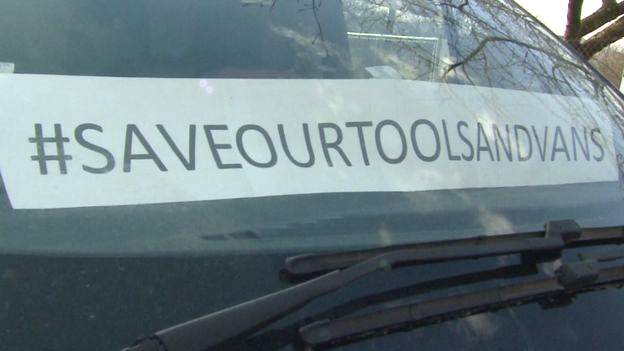Did you know that every day about 215 tradespeople report a tool theft?
According to Trade Direct Insurance, professionals in the U.K. would have to work over 450,000 days to pay for replacement tools each year. That sure is a lot of overtime, isn’t it?
Tradespeople in Plymouth have had enough. Earlier this year, over 150 tradesmen and women rallied together in protest. After noting an increase in the number of stolen tools, including power tools and other equipment, concerned workers wanted to do something to address the problem.
Concerns addressed on Facebook brought over 150 tradespeople together to protest
the heightened number of tool thefts in the U.K. Vist BBC News for more information.
Every jobsite is different, which is why there isn’t just one solution to putting a stop to tool theft around the world. Even so, Klein put together some handy strategies in hopes to bring awareness to what can be done, on and off the job.
Illumination Makes a Difference
If it’s obvious that nobody is onsite, nearby or watching, tools have been known to “walk away.” The darker the jobsite, the more likely it is that tools will be stolen, so keep jobsites as illuminated as possible. Additionally, try to park work vans in well-lit areas to create a stronger perception that the perpetrators could easily get caught. Keep these ideas in mind when storing your tools to make most thieves think twice about their plan.
Communication is Key
It’s important to facilitate open communication. This includes not only with fellow tradespeople but also with neighbors living and working in the surrounding area. A sign-out sheet for shared tools assigns responsibility to someone specific and helps keep track of where a tool might be. Meanwhile, educating the surrounding community regarding the effects of jobsite theft is just as important. Others may be able to keep an eye on things off the clock, so encourage them to report any suspicious activity they see.
Personalization Goes a Long Way
Personalizing your tools and equipment can make them less attractive to those looking to sell items and make a profit. Imagine having to grind-off deep etchings or paint over obnoxious blotches. The effort is just not worth it. Plus, if the tool is sold, your name engraved on the tool could help to relocate it.
While these steps won’t prevent all thefts from taking place, they can help deter any unwanted, suspicious activity. Other solutions can include investments in surveillance, GPS tracking, high-quality lock boxes and more.
What do you do to prevent tool theft? Share your tips with us on social media!

